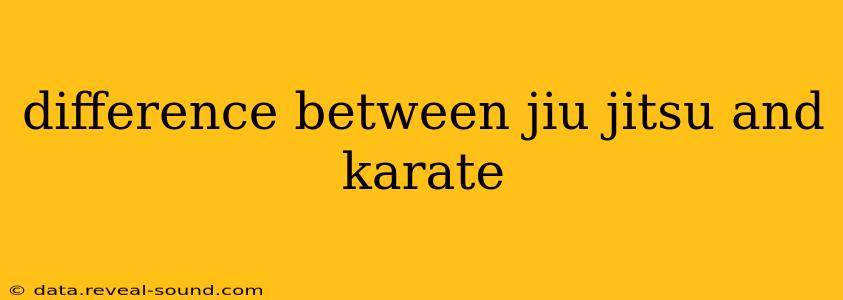Martial arts offer a diverse range of disciplines, each with unique strengths and philosophies. Jiu-Jitsu and Karate, while both effective fighting styles, differ significantly in their approaches to combat. This detailed comparison will explore the core differences, helping you understand which art might be the right fit for you.
What is Jiu-Jitsu?
Jiu-Jitsu, particularly Brazilian Jiu-Jitsu (BJJ), focuses on grappling and ground fighting. It emphasizes taking the fight to the ground, using leverage, technique, and submissions to overcome a stronger opponent. Strikes are largely absent from the core curriculum, with the primary goal being to control and subdue your opponent through joint locks, chokes, and positional dominance.
Key Characteristics of Jiu-Jitsu:
- Ground-based: The majority of techniques are performed on the ground.
- Grappling focused: Emphasis on takedowns, holds, sweeps, and submissions.
- Leverage and technique over power: Smaller individuals can effectively subdue larger opponents.
- High level of physical contact: Training involves a significant amount of close-quarters grappling.
- Self-defense oriented: Techniques are designed to neutralize and control an attacker.
What is Karate?
Karate is a striking-based martial art originating in Okinawa, Japan. It emphasizes the use of punches, kicks, blocks, and open-hand strikes to defend against and defeat an opponent. While some styles incorporate grappling, the core focus remains on stand-up fighting and powerful techniques.
Key Characteristics of Karate:
- Stand-up fighting: Techniques are primarily performed while standing.
- Striking focused: Emphasis on punches, kicks, blocks, and open-hand strikes.
- Power and precision: Techniques require strength, speed, and accuracy.
- Kata and self-improvement: Many styles incorporate kata (forms) for practice and self-development.
- Self-defense and discipline: Combines physical training with mental discipline and self-control.
Jiu-Jitsu vs. Karate: A Head-to-Head Comparison
| Feature | Jiu-Jitsu | Karate |
|---|---|---|
| Primary Focus | Grappling and ground fighting | Striking and stand-up fighting |
| Techniques | Joint locks, chokes, submissions, sweeps | Punches, kicks, blocks, open-hand strikes |
| Fighting Range | Close range | Mid to long range |
| Strength/Size | Less reliant on brute strength | Strength and power play a significant role |
| Training Style | High level of physical contact | Less physical contact, more focus on forms |
What are the benefits of Jiu-Jitsu?
Many people choose Jiu-Jitsu for its incredible self-defense applications. The focus on ground fighting makes it highly effective against larger, stronger opponents. It also builds strength, flexibility, and endurance. Furthermore, BJJ fosters a strong sense of community and self-discipline.
What are the benefits of Karate?
Karate improves cardiovascular health, strength, flexibility, and coordination. It emphasizes self-discipline, focus, and respect. The striking techniques can be effective in self-defense situations, particularly at longer ranges. Furthermore, mastering Kata can improve balance and body awareness.
Which martial art is better for self-defense?
The "better" martial art for self-defense depends heavily on individual circumstances and preferences. Jiu-Jitsu excels in close-quarters combat and ground fighting, while Karate is more effective at longer ranges. A combination of both styles could provide the most comprehensive self-defense capabilities.
Is Jiu-Jitsu harder than Karate?
The relative difficulty of Jiu-Jitsu versus Karate is subjective. Jiu-Jitsu requires significant stamina and physical exertion due to the constant grappling. Karate demands precision, power, and discipline in its striking techniques. Both arts require dedication and consistent training to achieve proficiency.
Which martial art is better for fitness?
Both Jiu-Jitsu and Karate offer excellent fitness benefits. Jiu-Jitsu is a fantastic full-body workout, building strength, endurance, and flexibility. Karate improves cardiovascular health, strength, and coordination. The best choice depends on your fitness goals and preferences.
This comparison provides a general overview. The specific techniques and styles within each martial art can vary considerably. Ultimately, the best way to determine which art is right for you is to try classes in both Jiu-Jitsu and Karate and see which one resonates with your goals and learning style.
